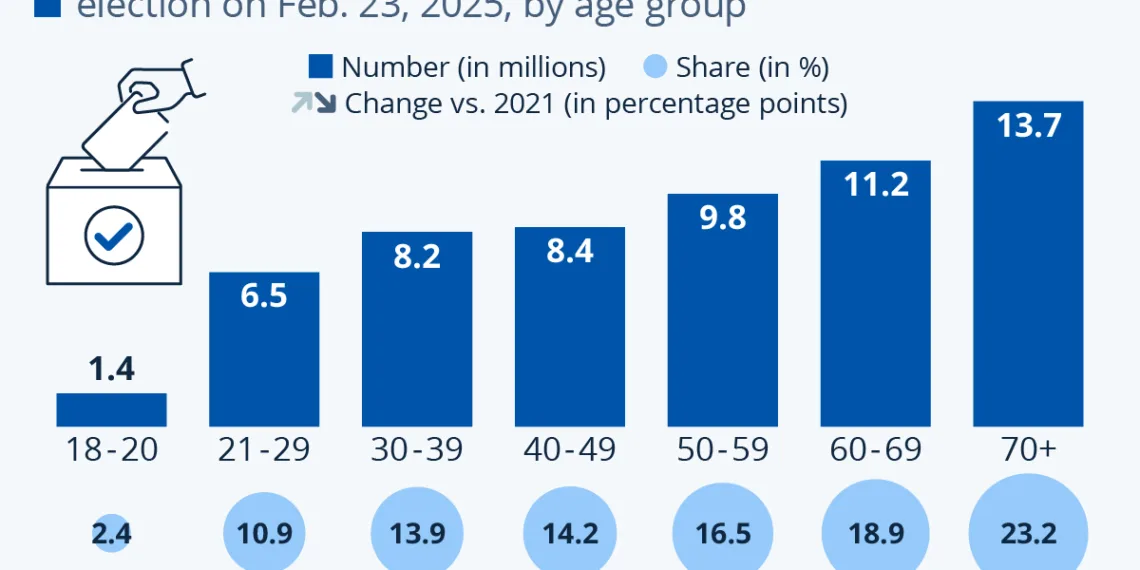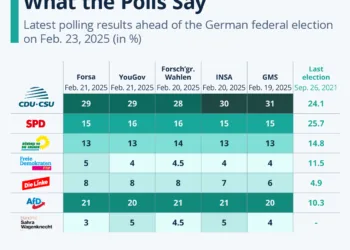The Dynamics of Germany’s Electoral Landscape: A Closer Look at Ageing Voters and the Youth’s Concerns
Germany’s political environment stands at a crucial inflection point, characterized by shifting voter demographics and rising tensions. The upcoming snap election, prompted by dissatisfaction with the recent coalition government, underscores these changes, revealing a complex interplay of age, concerns, and party politics.
Background: The Political Climate in Germany
Angela Merkel’s Long Tenure and Its Aftermath
After 16 years of Angela Merkel, whose leadership was marked by stability and continuity, Germany has entered a new chapter that has proven to be less favorable for many constituents. The subsequent coalition government—comprising the Social Democrats, the Greens, and the Free Democrats—has often been criticized and viewed as less effective. This discontent has led to rising political polarization in the country.
The Influence of the Covid-19 Pandemic
The Covid-19 pandemic has exacerbated existing divisions within German society. Restrictions and governmental decisions have sparked debates over personal freedoms, economic policy, and the state’s role in crisis management. This growing unease has opened the door for alternative parties, particularly the far-right Alternative for Germany (AfD), which has capitalized on public dissatisfaction.
The Rise of the AfD: Populism Takes Center Stage
A Growing Support Base
Recent polls indicate that the AfD is poised to secure approximately 20% of the popular vote in the upcoming election. This marks a significant rise in support, reflecting the frustrations of voters grappling with inflation and economic recession. The party’s right-wing populist platform resonates with segments of the electorate that feel overlooked by traditional political parties.
Opposition to Progressive Values
The AfD has positioned itself against core tenets of the European Union, advocating for policies that run counter to inclusivity and environmental stewardship. Their denial of climate change and calls to roll back existing climate policies directly clash with the priorities of younger generations, who view climate action as a crucial element for the future.
The Youth Vote: Concerns and Disenfranchisement
A Marginalized Demographic
Despite their active engagement in political discourse, young voters in Germany face significant challenges in influencing electoral outcomes. Statistics from the Federal Statistics Office reveal that only 13% of eligible voters are under 30, while those over the age of 60 comprise more than 40% of the electorate. This stark demographic reality raises concerns about the representation of progressive values that many young people champion.
Echoes of the Brexit Referendum
The situation bears similarities to the 2016 Brexit vote in the UK, where youthful proponents of staying in the EU found themselves outnumbered by older voters favoring departure. The implications of demographic power imbalances resonate in both cases, affecting future policy directions and national discourse.
Youth Engagement and Counter-Movements
Mobilization for Progressive Change
In response to the rise of the AfD, a significant counter-movement has emerged in Germany. Recent weeks have seen over a million demonstrators advocating for a society that embodies open-mindedness and diversity. This mobilization, largely driven by younger citizens, highlights their urgency to shape policy discussions around critical issues such as immigration, climate change, and social justice.
The Future of Political Engagement
Despite feelings of powerlessness, young Germans continue to express their concerns and hopes for the future. Activism, civil engagement, and grassroots movements are just some of the ways in which they seek to influence the political landscape. Yet, the looming question remains: will their collective voice be enough to sway a predominantly older electorate in this election?
Summary
Germany’s snap election reflects a nation grappling with profound demographic shifts and ideological divides. As the country approaches this pivotal moment, the interplay between ageing voters and an impassioned youth presents a unique political conundrum, shaping the future of governance and society at large in Germany. The coming days will certainly be telling, not just for the immediate electoral outcomes but for the overarching trends in German politics as well.




